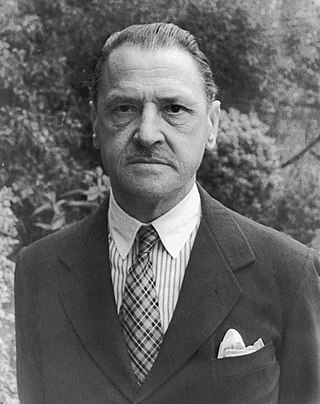
William Somerset Maugham was an English writer, known for his plays, novels and short stories. Born in Paris, where he spent his first ten years, Maugham was schooled in England and went to a German university. He became a medical student in London and qualified as a physician in 1897. He never practised medicine, and became a full-time writer. His first novel, Liza of Lambeth (1897), a study of life in the slums, attracted attention, but it was as a playwright that he first achieved national celebrity. By 1908 he had four plays running at once in the West End of London. He wrote his 32nd and last play in 1933, after which he abandoned the theatre and concentrated on novels and short stories.

Liza of Lambeth (1897) was W. Somerset Maugham's first novel, which he wrote while he was a medical student and obstetric clerk at St Thomas's Hospital in Lambeth, then a working-class district of London. It depicts the short life and death of Liza Kemp, an 18-year-old factory worker who lives with her aging mother in the fictional Vere Street off Westminster Bridge Road (real) in Lambeth.

The Razor's Edge is a 1944 novel by W. Somerset Maugham. It tells the story of Larry Darrell, an American pilot traumatized by his experiences in World War I, who sets off in search of some transcendent meaning in his life. The story begins through the eyes of Larry's friends and acquaintances as they witness his personality change after the war. His rejection of conventional life and search for meaningful experience allows him to thrive while the more materialistic characters suffer reversals of fortune.
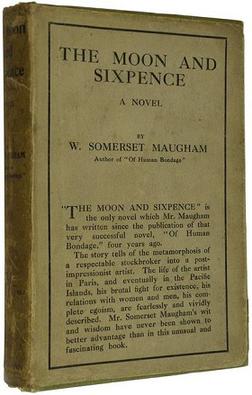
The Moon and Sixpence is a novel by W. Somerset Maugham, first published on 15 April 1919. It is told in episodic form by a first-person narrator providing a series of glimpses into the mind and soul of the central character, Charles Strickland, a middle-aged English stockbroker, who abandons his wife and children abruptly to pursue his desire to become an artist. The story is, in part, based on the life of the painter Paul Gauguin.

Of Human Bondage is a 1915 novel by W. Somerset Maugham. The novel is generally agreed to be Maugham's masterpiece and to be strongly autobiographical in nature, although he stated, "This is a novel, not an autobiography; though much in it is autobiographical, more is pure invention." Maugham, who had originally planned to call his novel Beauty from Ashes, finally settled on a title taken from a section of Spinoza's Ethics. The Modern Library ranked Of Human Bondage No. 66 on its list of the 100 best English-language novels of the 20th century.
Matthew Kneale is a British writer. He is best known for his 2000 novel English Passengers.
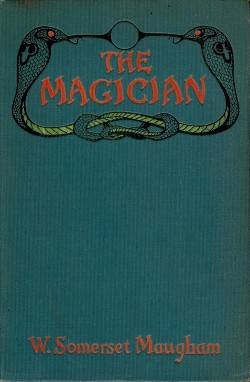
The Magician is a novel by British author W. Somerset Maugham, originally published in 1908. In this tale, the magician Oliver Haddo, a caricature of Aleister Crowley, attempts to create life. Crowley wrote a critique of this book under the pen name Oliver Haddo, in which he accused Maugham of plagiarism.

Cakes and Ale, or, The Skeleton in the Cupboard (1930) is a novel by the British author W. Somerset Maugham. Maugham exposes the misguided social snobbery levelled at the character Rosie Driffield, whose frankness, honesty, and sexual freedom make her a target of conservative opprobrium. Her character is treated favourably by the book's narrator, Ashenden, who understands that she was a muse to the many artists who surrounded her, and who himself enjoyed her sexual favours.

If Nobody Speaks of Remarkable Things is British writer Jon McGregor's first novel, which was first published by Bloomsbury in 2002. It portrays a day in the life of a suburban British street, with the plot alternately following the lives of the street's various inhabitants. All but one person's viewpoint is described in the third person, and the narrative uses a flowing grammatical style which mimics their thought processes.
Helen Walsh is an English novelist and film director. Her novels include Brass, which won a Betty Trask Award, and Once Upon a Time in England, which won a Somerset Maugham Award.
Rachel Cusk is a British novelist and writer.

The Painted Veil is a 1925 novel by British author W. Somerset Maugham. The title is a reference to Percy Bysshe Shelley's 1824 sonnet, which begins "Lift not the painted veil which those who live / Call Life".
Francis Spufford FRSL is an English author and teacher of writing whose career has seen him shift gradually from non-fiction to fiction. His first novel Golden Hill received critical acclaim and numerous prizes including the Costa Book Award for a first novel, the Desmond Elliott Prize and the Ondaatje Prize. In 2007 he was elected a Fellow of the Royal Society of Literature.
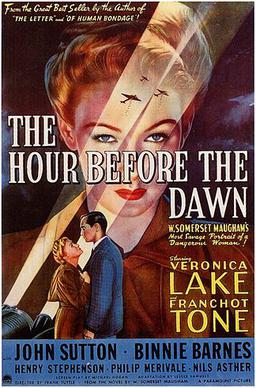
The Hour Before the Dawn is a 1944 American drama war film directed by Frank Tuttle starring Franchot Tone and Veronica Lake. It was based on the 1942 novel by W. Somerset Maugham.
Susan Elderkin is an English author of two critically acclaimed novels, her first, Sunset Over Chocolate Mountains won a Betty Trask Prize and was shortlisted for the Orange Prize for Fiction, her second, The Voices was shortlisted for the Ondaatje Prize and longlisted for the International Dublin Literary Award. She was one of Granta Magazine's 20 Best Young British Novelists in 2003 and won the 2007 Society of Authors Travel Award. She is the author, with Ella Berthoud, of The Novel Cure: An A-Z of Literary Remedies and The Story Cure: Books to Keep Kids Happy, Healthy and Wise.

Then and Now is a historical novel by W. Somerset Maugham. Set mainly in Imola, Italy, but also in other Italian cities, including Machiavelli's hometown Florence during the Renaissance, the story focuses on three months in the life of Niccolò Machiavelli, the Florentine politician, diplomat, philosopher and writer in the early years of the 16th century. The book was first published by Heinemann in 1946. It recollects Machiavelli's encounter with Cesare Borgia, who was the model on which Machiavelli based his Il Principe. Against that background, a love farce unfolds, in which Machiavelli tries to seduce the young wife of his host at Imola. The unsuccessful affair gave Machiavelli the idea of writing his first comedy, The Mandrake. Thus, Then and Now appears to combine the two best-known works of Machiavelli – The Prince and The Mandrake.
Robert Lorin Calder, a Canadian writer and professor, won the Governor General's Award for English-language non-fiction in 1989 for his Willie: The Life of W. Somerset Maugham, a biography based on extensive archival work and interviews with surviving associates of Maugham, in particular Alan Searle. Unlike Ted Morgan, who had obtained permission from Maugham's executors to publish from Maugham's letters in his biography (1980), Calder was refused permission to do so by the Royal Literary Fund and had to rely on paraphrase in referencing Maugham's unpublished correspondence.
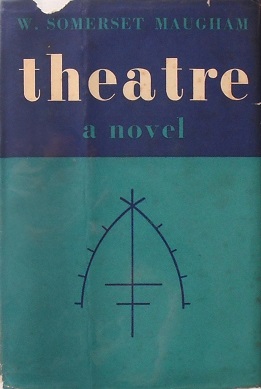
Theatre is a novel by the British writer W. Somerset Maugham, first published in 1937 by William Heinemann (UK) and Doubleday Doran (US).












